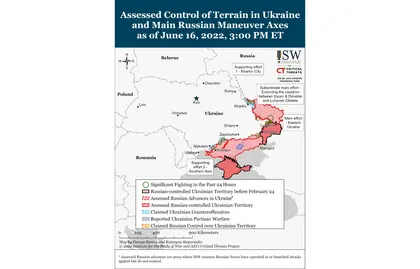The leaders of Germany, France, Italy, and Romania committed to Ukrainian officials that the West would not demand any concessions from Ukraine to appease Russia and will support Ukraine to the end of the war during a visit to Kyiv on June 16. French President Emmanuel Macron declared that France, Germany, Italy, and Romania are “are doing everything so that Ukraine alone can decide its fate.”[1] Macron added that Ukraine “must be able to win” and pledged to provide six more self-propelled howitzers.[2] German Chancellor Olaf Scholz stated that Germany will continue to provide financial, humanitarian, and weapons assistance for “Ukraine’s war of independence.”[3] Macron, Scholz, Italian Prime Minister Mario Draghi, and Romanian President Klaus Iohannis additionally vowed to back Ukraine’s bid to become an official candidate for European Union membership.[4] Sustained Western military support to Ukraine will be essential to enable Ukrainian forces to liberate Russian-occupied territory.
Ukrainian defense officials explicitly requested Western heavy artillery, unmanned aerial vehicles, and multiple-launch rocket systems (MLRS) ahead of a protracted war. Ukrainian Deputy Defense Minister Denys Sharapov and Land Force Command Logistics Commander Volodymyr Karpenko stated that Ukrainian forces need hundreds of artillery systems, including infantry fighting vehicles and tanks, as Ukrainian forces have suffered 30% to 50% equipment losses in active combat.[5] Sharapov and Karpenko noted that Ukrainian forces need Predator drones and loitering munitions to accurately strike Russian forces. Sharapov and Karpenko also asked for long-range precision weapons such as MLRS to defend the entire 2,500 km frontline in Ukraine.

EU Transfers €1.5 Bln Raised From Russian Assets for Ukraine
JOIN US ON TELEGRAM
Follow our coverage of the war on the @Kyivpost_official.
Ukrainian officials stated that Russian forces have already committed about 330,000 servicemen to their invasion of Ukraine without conducting partial or full-scale mobilization in Russia. Ukrainian General Staff Main Operations Deputy Chief Oleksiy Gromov stated that Russian forces grouped 150,000 servicemen into battalion tactical groups (BTGs) and other formations and involved additional 70,000 troops from air and sea elements, with the remaining personnel staffing non-combat support units.[6] Gromov noted that Russian forces committed more than 80,000 servicemen of the mobilized reserve, up to 7,000 reservists of the Russian Combat Army Reserve (BARS-2021), up to 18,000 members of the Russian National Guard (Rosguardia), and up to 8,000 troops from private military companies. Gromov did not specify if Ukrainian officials included information about forcibly mobilized servicemen in the Donetsk and Luhansk People’s Republics (DNR and LNR) in these numbers. Gromov noted that the Kremlin may still increase the number of Russian military personnel in Ukraine by executing covert or full mobilization.[7] Gromov noted that while it is unknown if the Kremlin will declare mobilization, Russian forces will still need time to execute the deployment and training of the new personnel whether or not the Kremlin announces full mobilization.
Key Takeaways
- Russian forces continued to launch ground assaults on Severodonetsk and settlements along the Ukrainian ground lines of communication (GLOCs) to Lysychansk. Ukrainian military intelligence reported that Russian forces are no longer operating as concrete battalion tactical groups (BTGs), as ISW previously assessed.
- Russian forces conducted unsuccessful offensive operations northwest of Slovyansk, while Ukrainian forces reportedly resumed preparations for counteroffensives west of Izyum.
- Russian and Ukrainian forces engaged in clashes north and northeast of Kharkiv City, though no significant territory changed hands.
- Russian forces continued to fortify fallback positions in northwestern Kherson Oblast, likely in anticipation of Ukrainian counteroffensives in the region.
- Head of the Donetsk People’s Republic (DNR) Denis Pushilin continued to discuss and sign patronage agreements with Russian regional officials.
Authors: Kateryna Stepanenko, Mason Clark, George Barros, and Grace Mappes
See full report here here.
You can also highlight the text and press Ctrl + Enter






